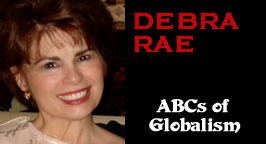HISTORY'S
"NOSTRADAMUS EFFECT"
PART 2
By
Debra Rae
February 7, 2010
NewsWithViews.com
Part 2: Stark Existentialism and Fantastic Escapism
As the 21st century unfolds, I’m reminded of dichotomies pondered by English novelist Charles Dickens in A Tale of Two Cities. All the more today, ours are “the best and worst of times.” This “age of wisdom and foolishness” shuffles incredulity with belief, Darkness with Light, despair with hope; and co-existing contradictions, as these, kindle foreboding and rouse forward speculation.
Regardless of age, status, and religious affiliation (or lack thereof), curious folks everywhere crave sneak-peeks of what’s to come. True to form, Discovery and History channels are airing provocative series focusing on futuristic events; and the big screen’s fantasy genre offers end-of-time dramas with intensely violent plots, apocalyptic themes, dark supernatural elements, and demi-gods strategically poised to redeem their fellows.
Recently, Hollywood launched a new wave of big-budget spectacles that depict our planet as all but obliterated. “Previews of coming attractions” confirm that more are on the way. After all, big-name stars aided by impressive special effects bring even bigger dollars at the box office, but not without cultural impact.
Media Effect
Some surmise that Hollywood’s new batch of disaster films is triggered by “topical anxieties,” as was the case in the 1930s when the Great Depression inspired escapism via whimsical musicals. To reference real-life experiences, movie goers likewise flocked to dark social commentaries.
For example, the New York Herald Tribune described Jimmy Cagney’s performance in Warner Brothers’ The Public Enemy (1931) as "the most ruthless, unsentimental appraisal of the meanness of a petty killer the cinema has yet devised."
Experimental psychology documents significant media effect—particularly on youth highly susceptible to imbedded messages. Their longer-term behaviors and attitudes are shaped by persuasive lessons gleaned even from fiction.
Cagney’s callousness pales when compared to 21st century counterparts. Given the genius of modern cinematography and unmatched access to cutting-edge technology, evil packs a wallop never before possible, as demonstrated by the 20th Century Fox production, Avatar, which holds hope for out-grossing even Hollywood’s blockbuster of all time, the Titanic.
Avatar
In this body-snatching science fiction saga, a paraplegic war veteran, Marine Corporal Jack Sully, gets a fresh start and quickly finds out he’s “not in Kansas any more.” His is the distant world of Pandora, inhabited by the Na'vi.
While on an intelligence mission with intent to pillage, a remotely controlled avatar body (an incarnation of Sully) engages this otherworldly humanoid race. No surprise here: The love bug bites, and gruesome combat follows.
For the Na’vi, Sully’s a solo savior; but he’s not alone in Tinsel Town. “Belief” trumps “incredulity” through countless big screen heroes—namely, animated stitchpunk characters, a solitary messianic warrior (Eli), and “shining ones,” respectively, in these three films: 9, the Book of Eli, and 2012.
9, the Book of Eli, and 2012
Uniquely animated, Shane Acker’s 9 takes place in a magical world parallel to our own, one in which advanced machines rise up to destroy people. Following a protracted war, a group of nine little rag-doll robots, called stitchpunks, live a post-apocalyptic existence. One of their own (number 9) emerges as key to their survival.
Similarly post-apocalyptic, The Book of Eli is Oscar-winner Denzel's Washington's latest movie set in 2043. By guarding the Book of Eli, his character battles to save the future of humanity.
Distributed by Columbia Pictures, 2012 is yet another end-time disaster film. In the wake of calamitous earthquakes and horrifying tsunamis, destined to unfold in A.D. 2012, billions are left dead. The post-deliverance reality of plucky survivors may well suggest biblical millennialism, but promise of peace minus the Prince of Peace Himself exceeds incredulity. It’s downright deceptive.
Legion; Prince
of Persia: The Sands of Time; Clash of the Titans
Scott Stewart's supernatural thriller Legion credits as savior a supernatural
spiritual ally, the archangel Michael. As the story goes, a group of
strangers in an out-of-the-way eatery assume first line of defense when
God chooses to end their existence. Contrary to the Bible, God apparently
judges the human race no longer worthy of Him—or of redemption.
Come May yet another future-defying film will hit the silver screen. Set in medieval Persia (today’s Iran), a daring prince is tricked into unleashing the Sands of Time. Instead of saving the world, as intended, he unwittingly destroys a kingdom and transforms its population into fierce demons. The cure is for him to return sands to the hourglass—this, by using the Dagger of Time.
But wait, there’s more! Louis Leterrier’s Clash of the Titans likewise pits men against kings and kings against gods. Born a god but raised a man, Perseus traverses the forbidden worlds where he battles demons and beasts. Only if he can accept his power as a god will he survive and succeed in his mission to save his family from hell unleashed.
Media Effect Lessons
So, you ask, why not “lighten up”? These movies are all fantasy fiction featuring apocalyptic themes and would-be saviors. Granted, we’re not talking Sunday school—but then we mustn’t underestimate the media effect on young people especially.
Given today’s geo-political unrest, spiritual and economic shakings, coupled with unparalleled natural calamities, Hollywood’s cutting edge, 3-D images prove to be incredibly powerful. Arguably the most influential woman in the world, Oprah Winfrey gushes over the unimaginably creative, never-before-seen visuals and profound spiritual lessons to be derived from Avatar. Everyone, she insists, must see it and embrace its matchless spirituality.
Even more so than the Cult of Oprah, youth are all the more vulnerable to imbedded messages, many of which shape their religious and political leanings for life. For example, Avatar finds man (and humanoid facsimiles) pretty much on their own with a Creator God pretty much out of the picture. Pagan pantheism trumps Bible truth, and enlightenment requires altered states of consciousness, not revelation from God’s Word.
Whereas men are like gods in pursuit of their own salvation, deities manifest the nefarious character of fallen men. Additional a-biblical messages conveyed by Hollywood’s apocalyptic genre include: “Might makes right,” existential despair is one’s lot in life, god-men rule, and we are charged with saving ourselves.
Might Makes Right vs. Galatians 5:15; 20-21
In God’s economy, “might” never makes “right.” To “bite and devour” one another is to be consumed of one another; in other words, to take the sword is to perish with it.
While spiritual warfare and principled wars are biblically endorsed, carnal manifestations of enmities, strife, jealousy, outbursts of anger, disputes, dissentions, and factions are not.
These “works of the flesh” defy God and exclude offenders from His Kingdom, yet they characterize adversarial fantasy films that violently pit avatars against humanoids, stitchpunks against mechanical beasts, humans against despots, the “haves” against the “have-nots,” a prince against demons, men against kings, or kings against gods.
Existential Despair is Our Lot in Life vs. 2 Thessalonians 2:16
It’s true, biblical eschatology prophesies unprecedented shakings, economic and political upheavals, a series of armed conflicts, breakdown of the earth’s ecosystem, undermining of the Judeo-Christian ethic, religious deception, and persecution; but in Christ all are overcome.
“Apocalypse” in the New Testament delivers an overarching message of good, not evil. The term specifically references the “unveiling” or “revealing” of Jesus Christ. Add to this fulfillment of the plan of God for spiritual Israel and the wrap-up of God’s plan for national Israel; and hope reigns supreme.
Whereas the God of the Bible imparts everlasting consolation and good hope—not existential despair—each movie reviewed features an apocalyptic theme threatening natives on Pandora, rag dolls of yet another parallel world, humanity on earth, ancient kingdoms, and gods of forbidden worlds. None promise any long term effect of whatever pseudo-salvation is offered victims of catastrophe.
God-men Rule vs. Romans 3:4; Isaiah 52:11; Matthew 24:35
Each introduces dark, supernatural elements accompanying a range of other-worldly characters—e.g., brutish beasts to grotesque humanoids, a band of rag-tag robots to war-mongering, magical machines, a god-opposing archangel to fierce demons, Zeus to his nemesis Hades, god-men to the universal god-force.
In assessing the worth of any belief system, one principle prevails—let God be true and every opposing man (or spirit) a liar. Without discernment, the line is easily crossed. To embroil oneself in deceitful spirituality is to forfeit love of truth.
Save Yourself vs. John 3:3-7; 1 Peter 1:23; 1 John 5:1; Acts 4:12; John 14:6
Be they avatars, stitchpunks, royals, or god-men, Hollywood’s leading wo/men impart some sort of pseudo-salvation when invading Marines, corporate tycoons, magical technology, despots, demons, demi-gods and/or natural calamities threaten human existence.
But none can save apart from the politically incorrect, but biblically sound concept of salvation: Unless one is “born from above,” he’s excluded from God’s kingdom. We are “born again” by the Word of God; and to believe that Jesus is the Christ is to be born of God. Neither is there salvation in any other, for there is no other savior apart from Him.
|
Subscribe to the NewsWithViews Daily News Alerts! |
Whether affirmed or maligned, Christian believers experience what the God of the Bible delivers, but post-apocalyptic Hollywood cannot—namely, palpable hope. More to come in Part 3. For part one click below.
Click here for part -----> 1,
















